In Dubai, no personal income tax enhances competitive salaries, with an average monthly after-tax salary of about USD 4,034 (≈ AED 14,815.74). Renting a one-bedroom apartment downtown might cost AED 9,052.09, while basic utilities for an ~85m² flat average about AED 841.11 monthly. Typical food budgets for an individual often range AED 800–1,200/month. Healthcare is mandatory in Dubai and often employer-covered; Essential Benefits Plan (EBP) premiums commonly start around AED 1,025/year depending on category and insurer. While costs are high, strategic budgeting aligns expenses with salaries. Explore further to uncover more aspects of living affordably in this dynamic city.
Overview of Dubai’s Cost of Living
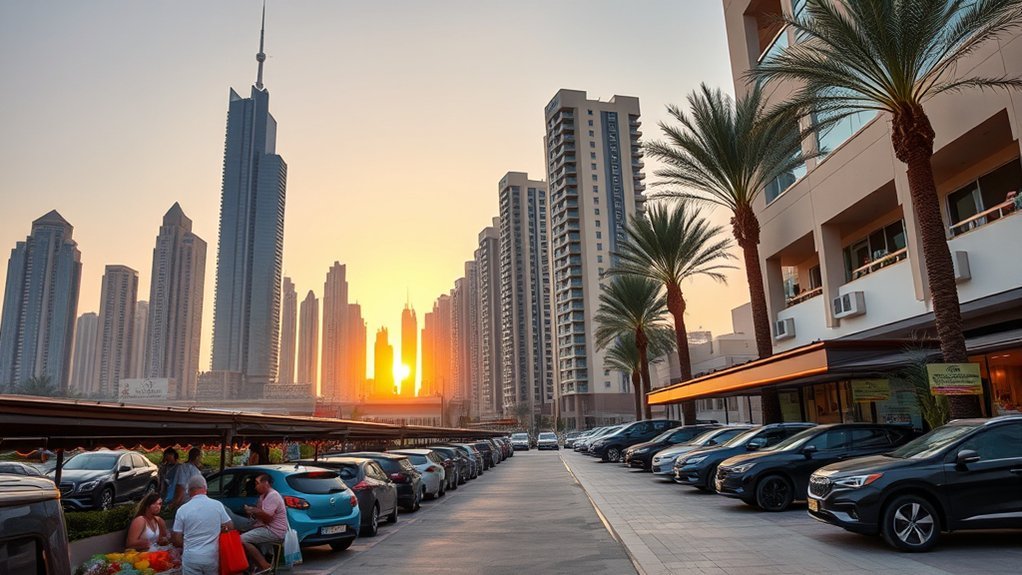
How does Dubai‘s cost of living stack up against other global cities? In 2024, Dubai ranks 15th in Mercer’s data, making it one of the more expensive cities worldwide. For expats, housing costs significantly contribute to this ranking. Rent hikes were notable, with apartments up about 22.2% and villas up 13.1% year-to-date through May 2024. Typical monthly expenses, excluding rent, are around AED 4,268 for a single person and AED 14,844 for a family of four. These figures highlight the financial demands on expats residing in Dubai.
Compared to cities like Hong Kong, Singapore, and London, Dubai remains slightly more affordable on certain indicators, though the overall cost of living has risen. Central expat areas see higher living costs, with one-bedroom rents around AED 9,052.09 and three-bedroom rents at approximately AED 17,045.50. Understanding these costs is crucial for evaluating salary expectations and budgeting effectively in Dubai. Additionally, accurate quotes from builders are necessary for budgeting in different markets, just as they are in the housing market.
Housing and Rent Prices in Dubai
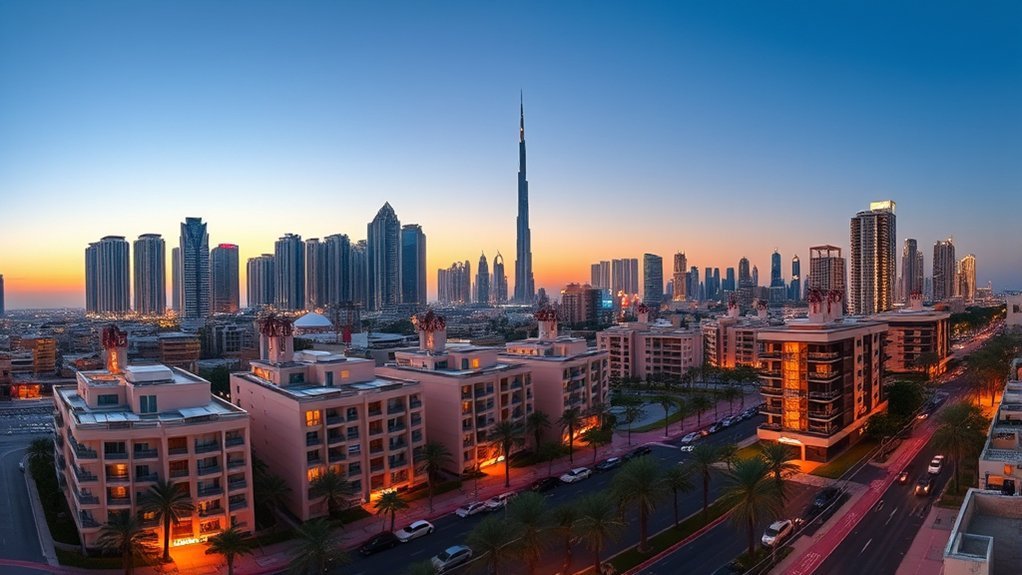
When considering housing in Dubai, you’ll find that one-bedroom apartments in the city center average about AED 9,052.09, while those outside the center are around AED 5,694.06, highlighting a substantial cost difference based on location.
Utility expenses for a single person are part of overall costs; excluding rent, monthly expenses average AED 4,268 for a single and AED 14,844 for a family of four.
If you’re moving with a family, note that three-bedroom apartments in the city center average around AED 17,045.50, while outside-center options average AED 11,462.50. Additionally, it’s crucial to consider the total cost of living, which includes various other essential expenses that can impact your overall budget.
Downtown Rent Costs
Considering a move to Dubai’s vibrant city center? Downtown rents in the Dubai City Centre, particularly for a 1-bedroom apartment, average around AED 9,052.09 in monthly rent, compared with outer areas where a 1-bedroom averages about AED 5,694.06.
Here’s a concise breakdown:
| Apartment Type | Downtown Rent (AED) | Outside City Centre (AED) |
|---|---|---|
| 1-Bedroom | 9,052.09 | 5,694.06 |
| 3-Bedroom | 17,045.50 | 11,462.50 |
| Rent Increase (%) | 22.2% (Apartments, YTD May 2024) | 13.1% (Villas, YTD May 2024) |
Popular expat districts such as JLT, Dubai Marina, JBR, and Old Town offer vibrant community living, with Uptown Dubai Residences providing premium options.
Utilities and Internet
Why do utilities and internet costs matter when assessing living expenses in Dubai? They significantly impact your monthly expenses. For a typical 85m² (~915 sq ft) apartment, basic utilities average AED 841.11 per month (range ≈ AED 581–1,200). Home internet (60 Mbps+) is about AED 358.50 monthly, and a mobile plan (10GB+ data) averages around AED 228.72. Given the city’s climate, cooling expenses may rise, affecting overall affordability.
Family Housing Options
How do you navigate the complex landscape of family housing options in Dubai? Analyzing Dubai rent trends is essential. For family housing, a three-bedroom apartment in the city center costs around AED 17,045.50 monthly, while outside-center options average AED 11,462.50. When planning, account for utilities and connectivity as noted above.
Utilities and Connectivity Costs
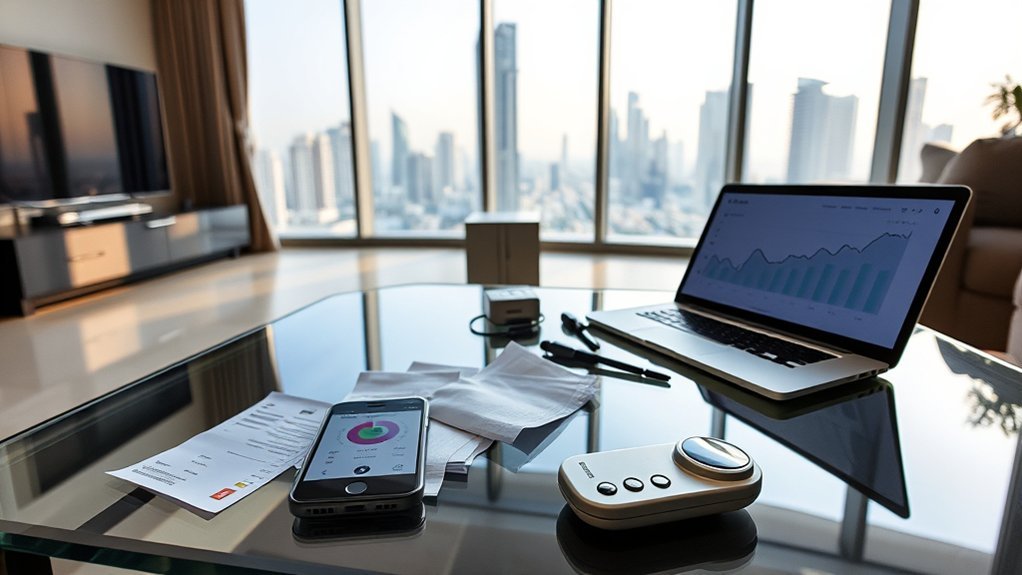
Ever wondered what it really costs to keep a home running in Dubai? Expect to pay between about AED 581–1,200 monthly for basic utilities in an ~85m² one-bedroom apartment.
Connectivity is another essential expense. Internet services cost around AED 358.50 monthly, and typical mobile plans run about AED 228.72. These costs collectively shape the financial landscape for residents.
Food and Grocery Expenses
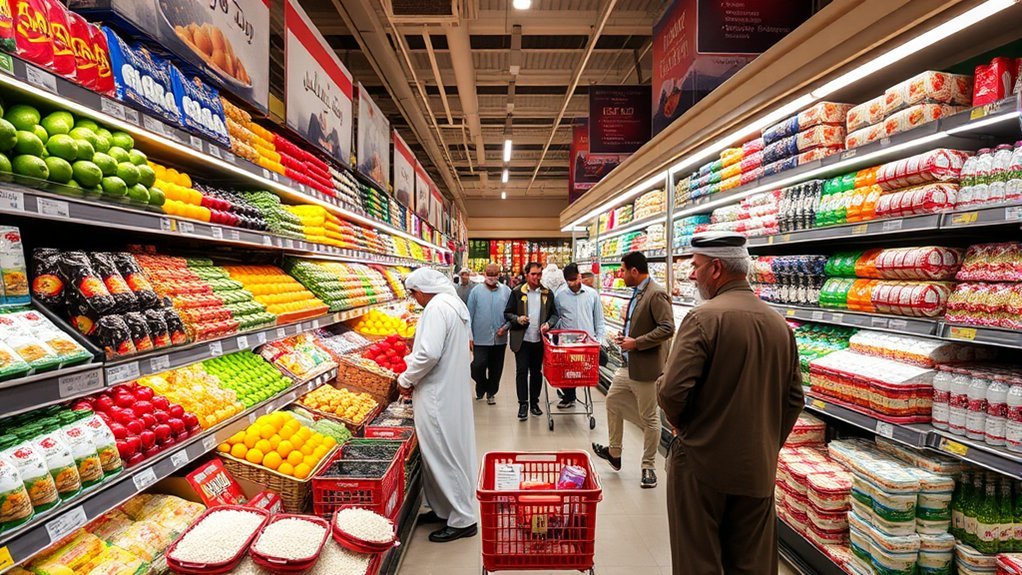
When considering food expenses in Dubai, you’ll find that dining out can vary significantly. A meal for two at a mid-range restaurant (three courses) averages about AED 300, while a McMeal is around AED 35. A loaf of fresh white bread (500g) is roughly AED 5.18, and chicken fillets (1kg) about AED 33.55. To manage your monthly food budget effectively, weigh dining and grocery costs against your income and spending habits.
Dining Out Costs
Curious about dining out in Dubai and how it might affect your budget? At a mid-range restaurant, expect roughly AED 300 for two (three courses). A McMeal is approximately AED 35, a cappuccino averages about AED 20.95, and a beer (0.5L draught) is around AED 49. These expenses contribute to overall Dubai food expenses and highlight the necessity for budgeting.
Grocery Price Comparison
While dining out in Dubai offers a variety of experiences, understanding grocery prices is just as essential for those managing their living expenses. The cost of living in Dubai (excluding rent) averages AED 4,268/month for an individual and AED 14,844/month for a family of four, which can guide how you plan grocery and other day-to-day costs.
Monthly Food Budget
To manage a monthly food budget in Dubai, consider your mix of dining out and groceries. For many residents, a practical range is AED 800–1,200 per month for a single person (groceries only), with families spending more depending on preferences.
Dining Out in Dubai: What to Expect
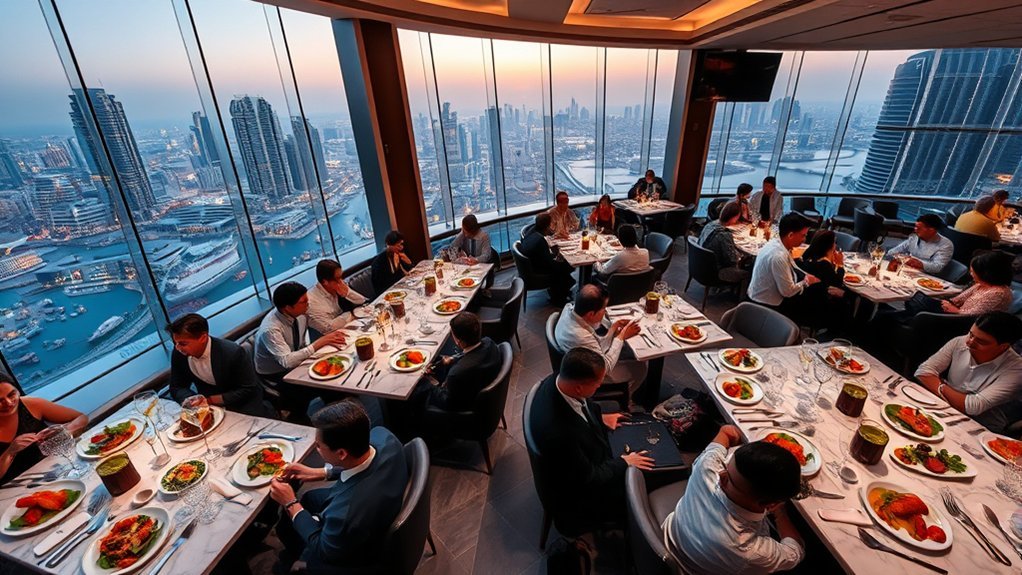
Dining out presents a broad spectrum of choices, from affordable fast food to upscale venues. In a mid-range restaurant, the cost per meal for two typically falls near AED 300 for three courses, while a McMeal ranges around AED 35. A casual coffee averages AED 20.95, and enjoying a beer in a pub averages AED 49.
Transportation and Commuting Costs
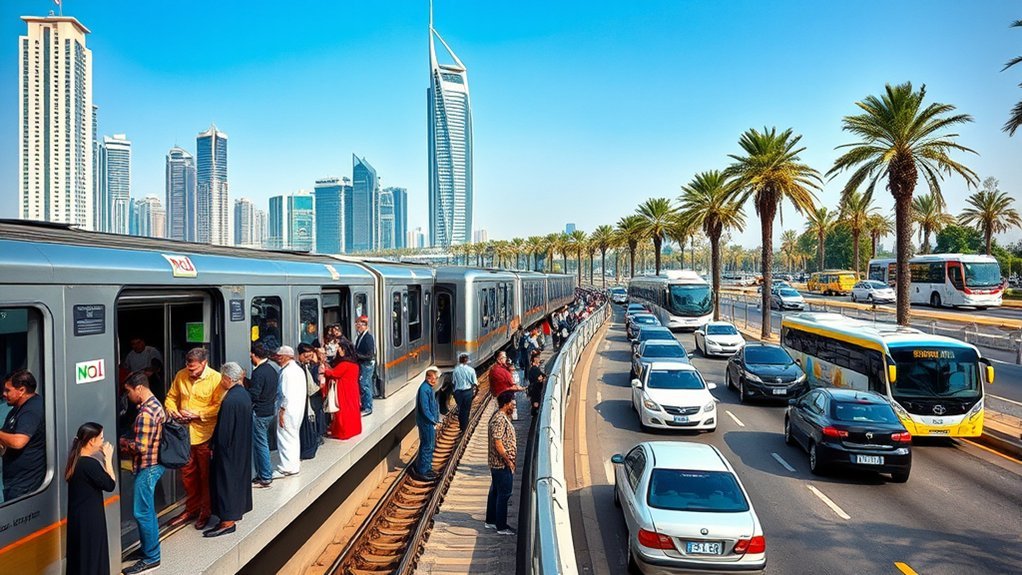
Dubai’s public transport is efficient. A monthly pass costs about AED 330. Typical taxi fares: start AED 12, ~AED 2.55/km. Gasoline averages about AED 2.83/liter. Plan connectivity too: home internet about AED 358.50 per month.
Health Insurance and Medical Expenses
In Dubai, health insurance is mandatory for residents under Dubai Health Insurance Law No. 11 of 2013. Employers typically provide coverage; sponsors must insure dependents. EBP options for eligible low-income residents commonly start from around AED 1,025–1,660 per year depending on plan and network. Separately, the UAE’s Involuntary Loss of Employment (ILOE) scheme is mandatory for most employees, with premiums starting at AED 5–10/month and benefits up to 60% of basic salary within caps.
Mandatory Health Coverage
Why is health insurance a critical consideration for anyone living in Dubai? Health insurance is legally required under Dubai’s framework. Expats mainly use private facilities. A health card can reduce costs at public facilities for those eligible.
Private Insurance Costs
Dubai’s private health insurance market varies widely by age and coverage. For low-income or non-working residents, the EBP can be a cost-effective option (from ≈ AED 1,025/year). Note the separate ILOE job-loss protection noted above.
Salary Expectations and Income Levels

How do salary expectations in Dubai align with the cost of living and career prospects? For expatriates, understanding salary dynamics is crucial given Dubai’s unique financial landscape. The average after-tax salary is about USD 4,034 (≈ AED 14,815.74) per month, and the UAE levies no personal income tax on employment income.
- Senior Roles: Packages vary by industry, company, and allowances.
- Compensation Packages: Housing, travel, and schooling allowances can materially impact feasibility.
- Negotiation: Benchmark to market rates and personal experience.
Budgeting for Expats in Dubai
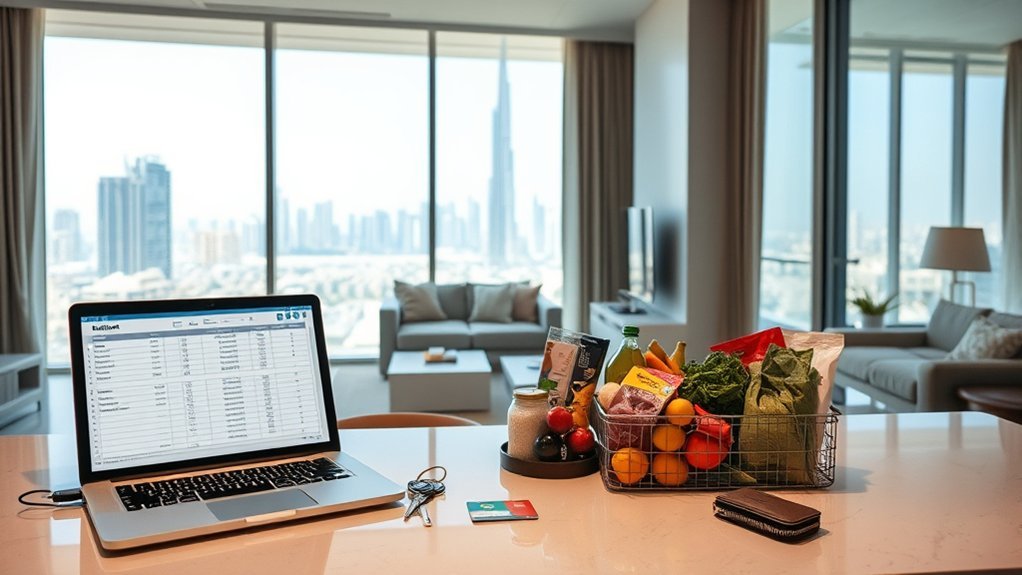
Navigating the financial landscape of Dubai can seem daunting, but with the right budgeting strategies, it’s manageable. A reference starting point: excluding rent, a single person averages AED 4,268/month and a family of four AED 14,844/month. Add representative rent (e.g., AED 5,694 for a 1-bedroom outside center) and utilities (AED 841) to estimate a monthly total. Although Dubai has no personal income tax, remember UAE VAT is 5% on most goods/services.
Comparing Dubai’s Costs With Other Global Cities
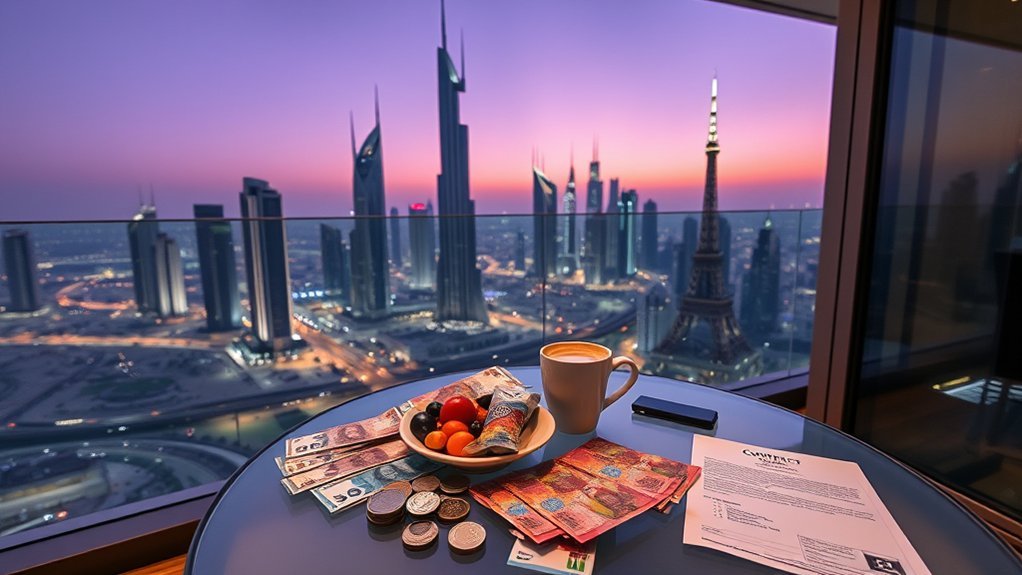
Ever wondered how Dubai’s living costs stack up against other global cities? Compared with Seattle (WA), cost of living (excluding rent) in Seattle is about 45.3% higher, and rent prices are about 4.6% higher than Dubai. Snapshot for budgeting:
- Housing Costs: One-bedroom city-center ~AED 9,052; three-bedroom ~AED 17,046.
- Utilities: ~AED 841 for an 85m² apartment; mobile+internet often add AED 587+.
- Budgeting: Family of four’s typical monthly costs, excluding rent, ~AED 14,844; singles ~AED 4,268.
Frequently Asked Questions
How Much Salary to Live Comfortably in Dubai?
It depends on housing location and lifestyle. As benchmarks, see updated rents, utilities, and cost-of-living figures above.
Is 50,000 AED a Good Salary in Dubai?
Generally yes for most lifestyles (assuming typical rents and dependents), with savings potential enhanced by no personal income tax on employment income.
What Is the Average Cost of Living in Dubai With Rent?
As an illustration, a single person might combine ex-rent costs ~AED 4,268 with a 1-bedroom outside center (~AED 5,694) and utilities (~AED 841) for a total near AED 10,800/month (≈ USD 2,940).
Can I Live in Dubai With a $4000 Salary?
Possibly, with careful budgeting and housing choices (e.g., outside-center rents). Cross-check current rents, utilities, and transport costs to align your plan.
Conclusion
Living in Dubai is like navigating a financial landscape where the peaks of luxury meet the valleys of sensible budgeting. Rent and utilities can climb high, but salaries often keep pace with these expenses. Dining out and groceries add flavor to your budget, while health insurance and connectivity costs require careful planning. Compared to other global cities, Dubai offers a complex yet manageable financial ecosystem, making it crucial to balance your lifestyle choices with a strategic budget.

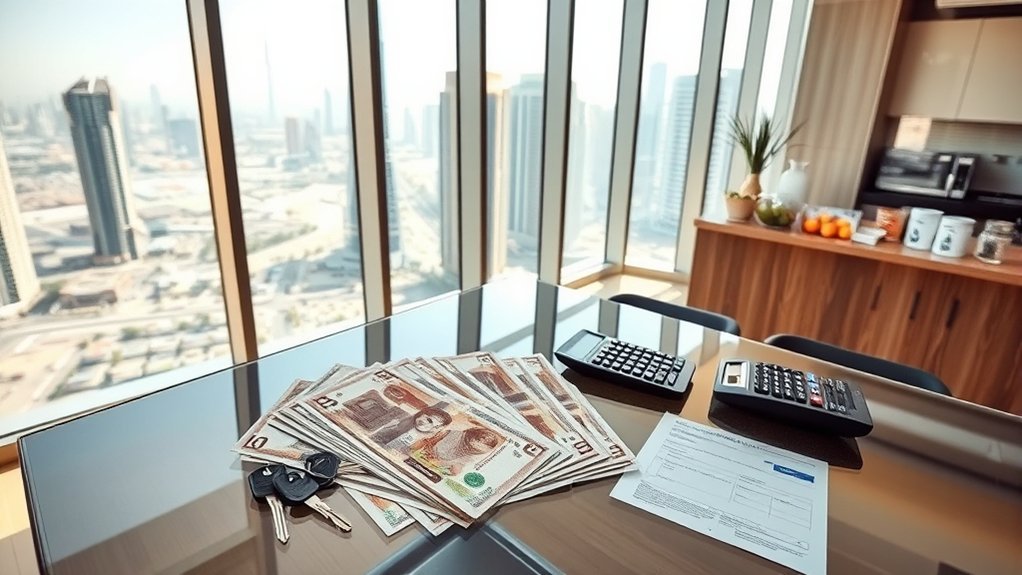

1 thought on “Average Living Cost in Dubai: Prices, Rent & Salary Guide”
Pingback: Is Dubai Currency Higher Than Australia? | UAETrav